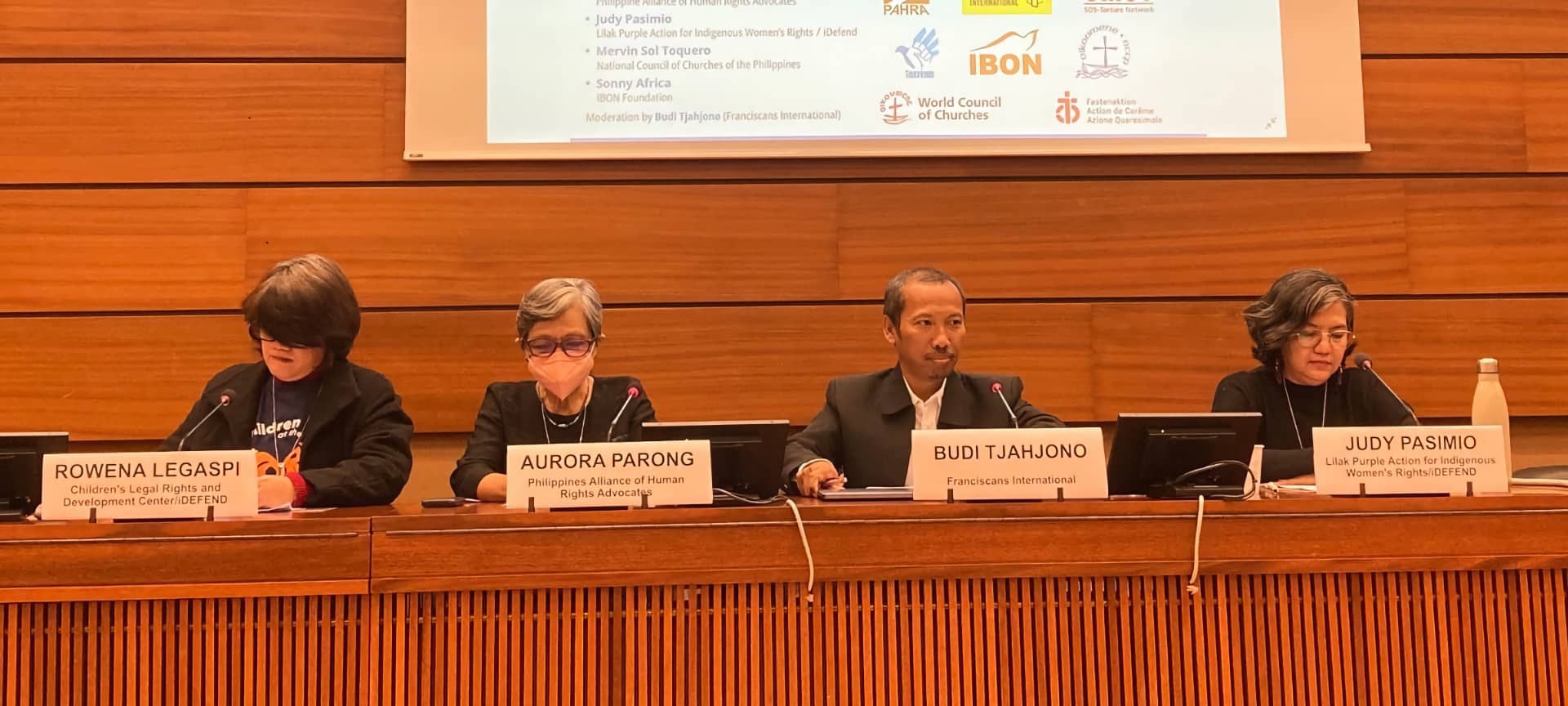
Geneva, Switzerland- Human rights groups including In Defense of Human Rights and Dignity Movement (iDEFEND), Philippine Alliance of Human Rights Advocates (PAHRA), Lilak Purple Action for Indigenous Women’s Rights and Children’s Legal Rights and Development Center (CLRDC) hoped that the fourth cycle of the Universal Period review of the Philippines brings more positive response from the government than the previous cycle.
In a side event organized Thursday afternoon at the UN Headquarters, organizers lamented the government’s lack of support for many recommendations of the last UPR cycle. They said neglect of these recommendations further weakened accountability systems and the rule of law in the country.
“Important economic recovery programs and pandemic response which the government is trying to implement today require competent and effective governance that addresses the multiple human rights crises resulting from the war on illegal drugs and the war on terror,” said Ms. Rowena Legaspi, Executive Director of CLRDC, “for example, there is no excuse for keeping crucial support and assistance away from the families of victims of extrajudicial killings, especially children and minors.”
“The reality is, for farmers, fishers, rural women, and indigenous peoples and their communities, the relentless assaults on their rights and freedoms prevent them from fully participating in economic recovery, in defending our natural resources and contributing to climate crucial change action,” Ms. Judy Pasimio, Executive Director of LILAK said, “under the Marcos Jr. government, the threats faced by rural and indigenous communities from mega infrastructure projects, and the aggressive promotion of large-scale mining projects, persist. Their defense of human rights are in fact seen as anti-progress”.
“The violent and militaristic approach is in place in the War of Terror. Individuals and certain segments of Philippine society are still being red-tagged and labelled as “enemies of the state” under the new government and those arbitrarily arrested and detained by the previous administration continue to languish in jail. The reprisal vs. human rights defenders, grassroots activists, journalists, lawyers and critics of government continues despite the UN Joint Programme on Human Rights being implemented in the Philippines,” shared Dr. Aurora Parong, Executive Committee member of PAHRA. “The 2009 Anti-Torture Act has seen only one conviction of a police officer despite the thousands of reported cases under the war on drugs as well as ill treatment of violators of COVID restrictions. The Medical Action Group cited no substantial investigation and prosecution of the torture cases they have documented”.
The speakers expressed appreciation for the continued support of the UN Human Rights Council, the Human Rights Committee and the UPR for the issues raised by the Philippine human rights community. They reiterated recommendations which should be put before the government namely:
Stop all the attacks and put an end to the killings of farmers, and land and environmental defenders, and encourage the Philippine government to enact the Human Rights Defenders Protection Bill ● Repeal and revoke laws and executive policies such as the Anti-Terrorism Law of 2020, EO 70, and abolish the NTF-ELCAC ● Immediately end the practice of red-tagging and enact a law that criminalizes red tagging and terrorist labelling of human rights defenders ● Strengthen mechanisms for corporate accountability both at the domestic level as well as regional and international ● Support the legally binding instrument to hold TransNational Corporations (TNCs) accountable for human rights abuses and violations ● Establish an independent international investigation (‘Commission of Inquiry”) into all allegations of torture especially on children, including extra-judicial killings, enforced disappearances, and arbitrary detention and provide compensation for the families of victims ●Provide a concrete support program for children neglected as a result of their parents detention or deaths due to the war on drugs- institutionalize support to left-behind families of the war on drugs through legislation and policies ● Amend the Dangerous Drugs Act using a public health paradigm to approach the issue of illegal drugs and rescind the Command Memorandum Circular No. 16-2016 (Oplan Double Barrel).





